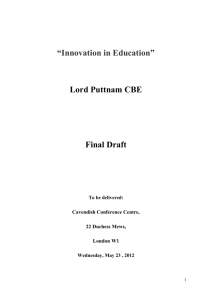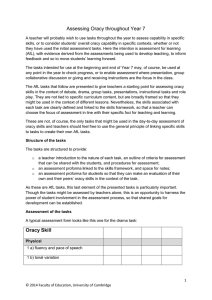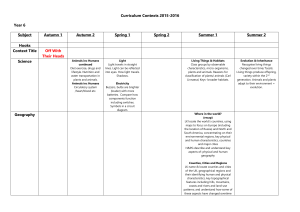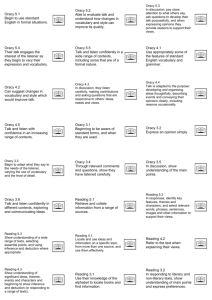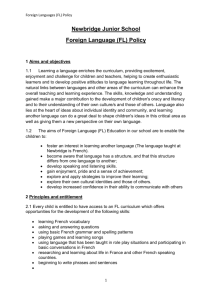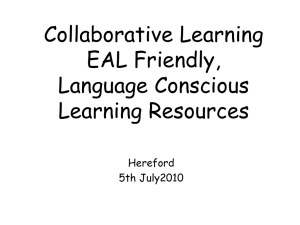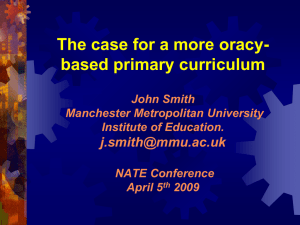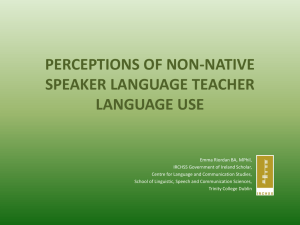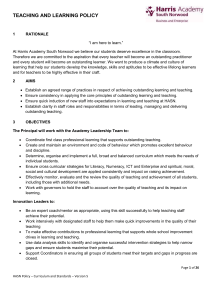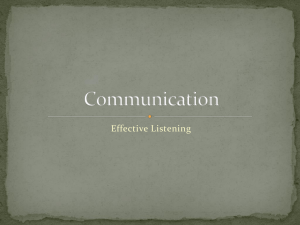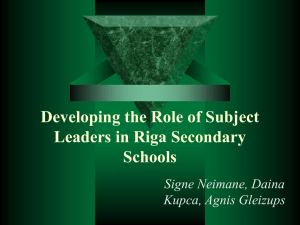Oracy and the English Classroom 4 File
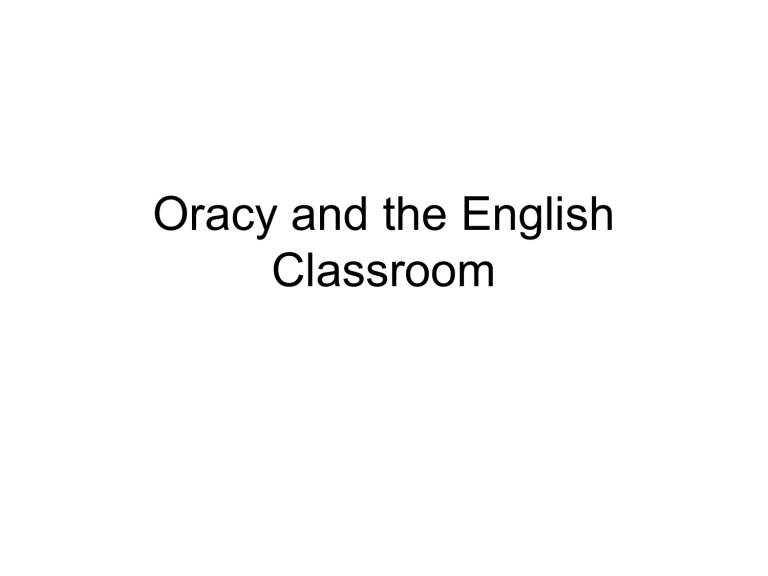
Oracy and the English
Classroom
Aims
• To consider the importance of speaking and listening in the classroom
• To consider what makes for effective exploratory talk
• To explore a range of ways to organise group talk
Objectives
• Know a range of ways to organise group talk for different activities/purposes
Oracy Session
• The importance of oracy
• Exploratory talk
• Good and bad speakers and listeners
• Group structures and sizes
• Recent developments around oracy
The Importance of Oracy
• On your table briefly brainstorm as many reasons as you can to answer the question:
• ‘Why is speaking and listening important in the classroom?’
Ways in which oracy is important in the learning process
• Helps students to acquire new knowledge, concepts and understandings
• Helps students form and revise their view of the world
• Helps students gain insight into others’ perceptions, ideas and opinions
• Provides an opportunity to try out theories and new ideas
• Provides opportunities to collaborate with others in the formulation of new insights
• Offers opportunities to interact with others and develop personal relationships
• Helps students come to terms with their emotions and feelings
• Helps students explore their individuality in the context of a social group
Insights from the Work of Vygotsky
• The relationship between thought and language
• Language as a tool for thought
• The Zone of Proximal Development
• Scaffolding
• “The implications of these ideas for pedagogy are, or course, enormous. If speech in childhood lays the foundations of a lifetime of thinking, how can we continue to prize a quiet classroom?”
• Vygotsky’s contribution to pedagogical theory,
James Britton in Brindley, Teaching English
Exploratory Talk
“Exploratory talk is that in which partners engage critically but constructively with each other’s ideas.
Relevant information is offered for joint consideration…..
“Knowledge is made publicly accountable and reasoning is visible in talk….
“It is an effective way of using language to think the process of education should ensure that every child is aware of its value and able to use it effectively.
“However, observational research evidence suggests that very little of it naturally occurs in classrooms when children work together in groups.”
Neil Mercer, Words and Minds (2000)
The Importance of Group Talk
• Choose one person in the group to be the observer
• Remaining members of the group read the statements in the envelope
• Using the statements, and your group’s own ideas draft a statement under the title ‘The
Importance of Group Talk in English’. This should be no more than 3 sentences.
• During the exercise, the observer must note talk behaviours, but not participate.
What Does a Good Talker and Listener Do?
• Shows sensitivity to others
• Makes eye contact
• Uses good body language
• Sometimes shows willingness to change opinions
• Has a sense of self-esteem
• Shows confidence in self and others
• Doesn’t dominate
• Supports speakers with comments and questions
• Avoids big chunks of delivery
• Shows interest/enjoyment
• Interrupts rarely and carefully
• Makes tentative comments
Good and Bad listeners- generated by a Year 3 class following role play
• Bad listeners
– Look around
– Ignore the speaker
– Make faces
– Start talking to someone else
– Interrupt
– Look at their watch
– Daydream
– Roll their eyes
…..and the speaker feels….
-cross
-angry
-unpopular
-irritated
-like hitting the listener
Good Listeners
say ‘Cor!’ ‘Yeah’ ‘Really?’
-nod
-get close
-agree
-look closely at the speaker
-are very interested
-Laugh in a friendly way
….and the speaker feels…..
-very pleased
-important
-popular
-happy
-successful
Golden Rules for Effective
Groupwork
• Given the work we’ve done on effective talk and group sizes and structures, agree on your table on a list of 5 golden rules you should follow as a teacher to ensure that effective group talk happens
Group Structures
• Pairs – talk partners, easy to organise, quick
• Pairs to fours- a quick way to compare ideas
• Snowball- pairs to fours to eights, etc…. A useful way to organise whole class debate and discussion
• Envoys- one member of each group is sent out to find information from other groups. Less troublesome that completely rearranging groups
• Rainbow- students work in groups on a topic, and then form new groups (e.g. numbered) to share ideas
• Jigsaw- expert groups work on a particular area, new groups formed containing an expert from each group to share information. Original groups reform to discuss ideas
The Teacher as Talker
• Should provide models
• Should sometimes be explicit about what she is doing
• Should use questions skillfully
• Should not be afraid of areas of ignorance
• Should take care to listen carefully
Questioning
• Should be seen as a key method of differentiation
• Should be seen as a useful tool to assess learning and reveal misconceptions
• Questioning models how experienced learners seek meaning
• Questions should be planned to lead students from unsorted knowledge to organised understanding, helping them to structure thinking
Questioning – Things to be careful about
• Overuse of closed, particularly one word answers and questions that don’t need thinking about
• Use of pseudo-open questions (where the teacher has a pre-determined answer)
• Not giving students time to think and rehearse answers
• Always taking answers from ‘hands-up’
• Handling wrong answers
• Rephrasing or repeating students responses
• Going off at tangents
• Questions that are too open
